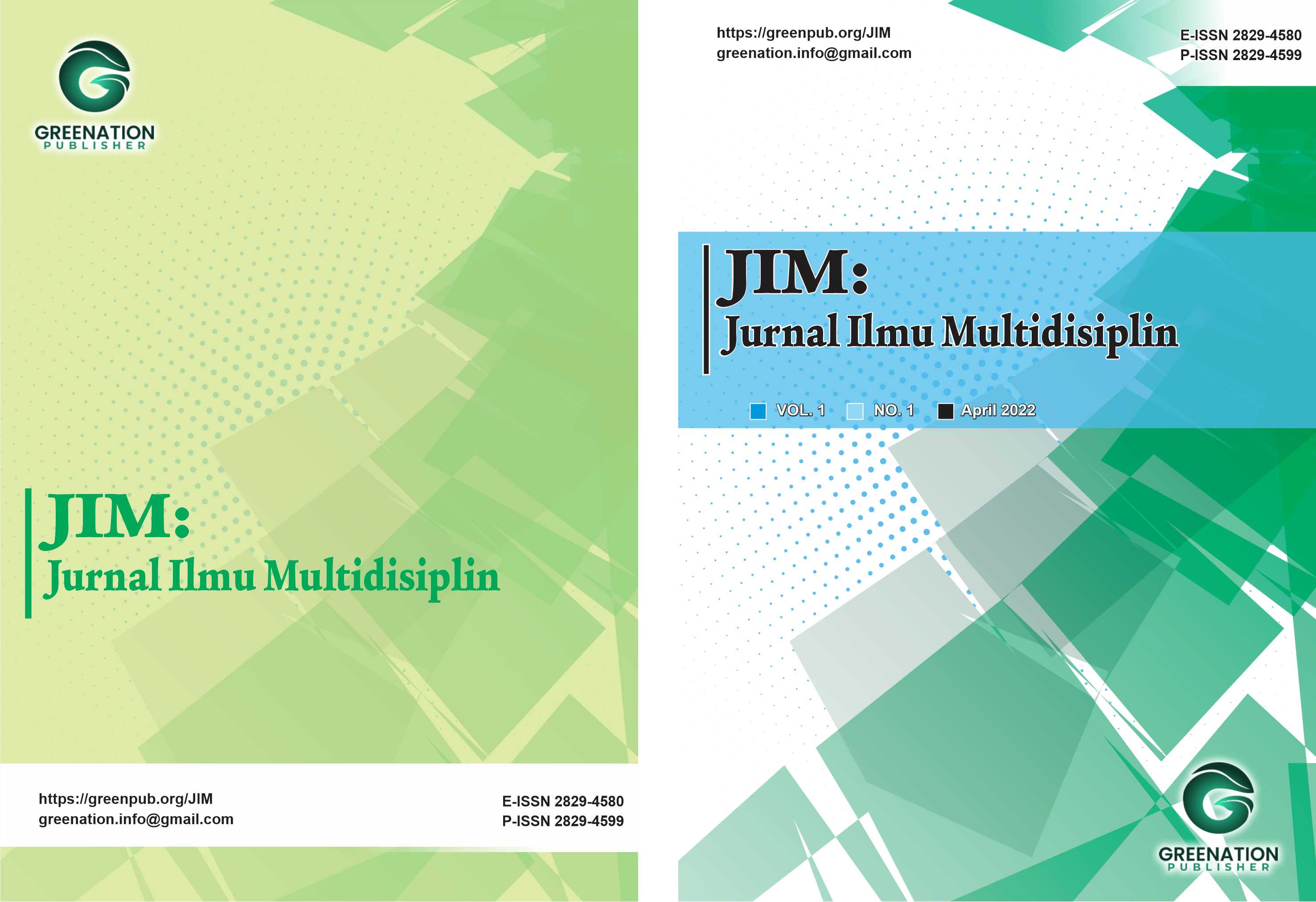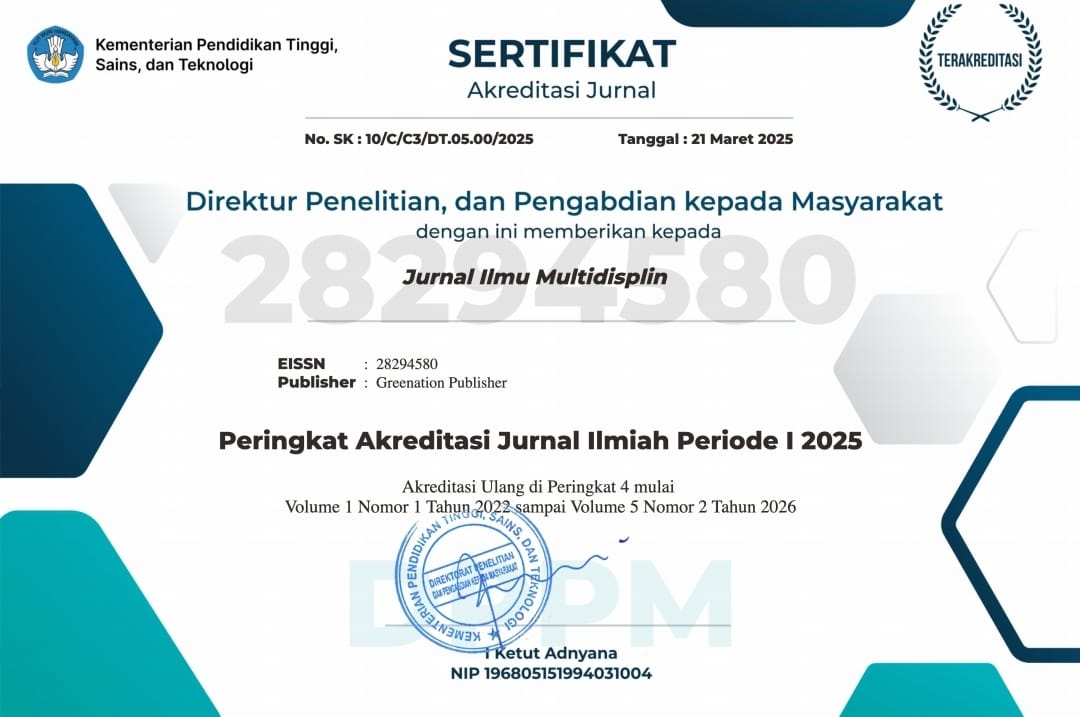Modernisasi dan Enkulturasi Budaya dalam Pendidikan Islam
DOI:
https://doi.org/10.38035/jim.v1i2.56Keywords:
Modernization, Enculturation, Islamic EducationAbstract
Globalization forces Islamic education as a system to continue to develop and adapt to the times, as well as proof that Islam has the principle of "Shólihun fí kulli zamánin wa makánin wa ummah". Therefore, the modernization and enculturation of Islamic education culture is an interesting issue to discuss. In this article, we will discuss theoretically using qualitative methods through library research on the modernization and enculturation of Islamic education culture in Indonesia. Critically, based on the data obtained in the form of qualitative data from various reading sources, books, articles, research, scientific publications and manuscripts for analysis. The results of the discussion show that Islamic education in Indonesia has experienced a clash of two paradigms, namely on the one hand it is affected by weternization and on the other hand it is affected by Arabization. With these two paradigms of view, Indonesian Islamic education creates its own Islamic "culture" that carries Indonesianness by internalizing Islamic values ??but at the same time has Middle-Eastern cultural values ??as the source of Islam itself and Western culture as the center of modernism.
References
Ali, H., & Limakrisna, N. (2013). Metodologi Penelitian (Petunjuk Praktis Untuk Pemecahan Masalah Bisnis, Penyusunan Skripsi (Doctoral dissertation, Tesis, dan Disertasi. In In Deeppublish: Yogyakarta.
Anshari, Endang Saifuddin. (2004) Wawasan Islam: pokok-pokok pikiran tentang paradigma dan sistem Islam. Jakarta: Gema Insani
Arfin, Zainal. 2013. Konsep dan Model Pengembangan Kurikulum. Bandung: Remaja Rosdakarya.
Asari, Hasan. (2007). Modernisasi Islam: Tokoh, Gagasan dan Gerakan, Kajian tentang Pekembangan Modern di Dunia Islam. Bandung: Citapustaka Media
Ashraf, Syed Ali. (1985) New Horizons in Muslim Education. Cambridge: Hodder & Stoughton.
Azra, A. (1990). Pendidikan Islam, Tradisi dan Modernisasi Menuju Milenium Baru. Logos.
Banks, J.A., Banks, & McGee, C. A. (1989). Multicultural education. Needham Heights, MA: Allyn & Bacon.
Battelle for Kids. (2019). P21 Partnership for 21st Century Learning. Battelle for Kids. http://www.battelleforkids.org/networks/p21/frameworks-resources
Cruz, A. P. S. (2013). Metode penelitian dan pengembangan. Journal of Chemical Information and Modeling, 1–30. https://doi.org/10.1017/CBO9781107415324.004
Damen, L. (1987). Culture Learning: The Fifth Dimension on the Language Classroom. Reading, MA: Addison-Wesley.
Deal, T. E., & Peterson, K. D. (2016). Shaping School Culture. Jossey-Bass.
Echols, John. M. dan Shadily, Hasan. (2005). Kamus Inggris Indonesia: An English-Indonesia Dictionary. Jakarta: Gramedia Pustaka Utama.
Fadjar, Malik. (1998). Madrasah dan Tantangan Modernitas. Bandung: Mizan
Gazalba, Sidi. (1973). Modernisasi dalam Persoalan, Bagaimana Sikap Islam Jakarta: Bulan Bintang.
Goleman, Daniel. 1999. Kecerdasan Emosi untuk Mencapai Puncak Prestasi. Jakarta: Gramedia Pustaka Utama.
Gwynne, R. N. (2009). Modernization Theory. International Encyclopedia of Human Geography, 7, 163–167. https://doi.org/10.1016/b978-0-08-102295.10107-6
Hardiman, F. B. (2004). Filsafat Modern. PT Gramedia Pustaka Utama.
Illahi, Sailah.2008. Pengembangan Soft Skills di Perguruan Tinggi. Jakarta : Direktorat Jenderal Pendidikan Tinggi.
Ismail. (2004). Paradigma Kebudayaan. Jakarta: Departemen Agama RI
Kemdikbud, B. B. (2021). Kamus Besar Bahasa Indonesia (KBBI). Kamus Online. https://kbbi.web.id/Pembudayaan
Madjid, Nurcholish. (2008). Islam Kemodernan dan Keindonesiaan. Bandung: Mizan
______________. (2005). Islam doktrin dan peradaban: sebuah telaah kritis tentang masalah keimanan, kemanusiaan, dan kemodernan. Jakarta: Yayasan Wakaf Paramadina
Malik, R. S. (2018). Educational Challenges in 21St Century and Sustainable Development. Journal of Sustainable Development Education and Research, 2(1), 9. https://doi.org/10.17509/jsder.v2i1.12266
Militzer, D. (2021). Partnership for 21st Century Skills. Calivornia Departmen of Education. https://www.cde.ca.gov/eo/in/cr/p21cskls.asp
Moleong, L. J. (2008). Metodologi Penelitian Kualitatif. PT Remaja Rosdakarya.
Nasution, Harun. (2003). Pembaharuan dalam Islam. Jakarta: Bulan Bintang
Nurcholis, Nurchalish. (1997). Bilik-Bilik Pesantren; Sebuah Potret Perjalanan. Jakarta: Paramadina.
OECD. (2019). PISA 2018 Results COMBINED EXECUTIVE SUMMARIES VOLUME I, II & III. In PISA 2009 at a Glance: Vol. I. https://doi.org/10.1787/g222d18af-en
Pajak EF. Willard Waller’s Sociology of Teaching Reconsidered: “What Does Teaching Do to Teachers?” American Educational Research Journal. 2012;49(6):1182-1213. doi:10.3102/0002831212444591
Pappas, S. (2021). What is Culture? Live Science. https://www.livescience.com/21478-what-is-culture-definition-of-culture.html
Rahman, Fazlur. Islam dan Modernitas: Tentang Transformasi Intelektual, terj. Akhsin Mohammad. Bandung: Pustaka, 1985.
Ramayulis. (2012). Sejarah Pendidikan Islam: Napaktilas Perubahan Konsep, Filsafat dan Metodologi Pendidikan Islam dari Era Nabi saw Sampai Ulama Nusantara. Jakarta: Kalam Mulia.
Satori, D., & Komariah, A. (2013). Metodologi Penelitian Kualitatif. Alfabeta.
Smith, Vernon. (1999). “Pendidikan Tradisional”, dalam Paulo Freire, dkk, Menggugat Pendidikan: Fundamentalis, Konservatif, Liberal, Anarkis. Terj. Omi Intan Naomi. Yogyakarta: Pustaka Pelajar.
Sholihan. (2008). Modernistas Posmodernitas dan Agama. Semarang: Walisongo Press.
Sugiyono. (2017). Metode Penelitian Kuantitatif, Kualitatif. Alfabeta, CV.
Supriyatno, H. (2020). Tazkia Pesantren Elit Besutan Alumnus UMM Kota Malang. Harian Bhirawa. https://www.harianbhirawa.co.id/tazkia-pesantren-elit-besutan-alumnus-umm-kota-malang/
Suryadi, Ace. 2002. Pendidikan, Investasi SDM, dan Pembangunan. Jakarta: Balai Pusataka
Suwarsono, A. Y. S. (1991). Perubahan Sosial dan Pembangunan di Indonesia: Teori-teori Modernisasi, Dependensi dan Sistem Dunia. Lembaga Penelitian, Pendidikan Dan Penerangan Ekonomi Dan Sosial, 95–204.
Syah, M. Noor Sulaiman. (2016). Challenges of Islamic Education in Muslimworld: Historical, Political, and Socio-Cultural Perspective, QIJIS: Qudus International Journal of Islamic Studies. Volume 4, Issue 1
Takdir, Mohammad. (2018). Modernisasi Kurikulum Pesantren. Yogyakarta: IRCiSod.
Trilling, B., & Fadel, C. (2009). 21st Century Skills: Learning for Life in Our Times. John Wiley & Sons, Inc. ossey-Bass.
UNESCO. (2017). Education for Sustainable Development Goals Learning Objectives (Note: Imp lementierung der BNE) (Issue March).
United Nations. (2020). Transforming our world: the 2030 Agenda for Sustainable Development. United Nation. https://sdgs.un.org/2030agenda
Wahid, A. (2001). Menggerakkan Tradisi. LKiS.
Waller, W. (1976). The sociology of teaching. New York, NY: John Wiley & Sons.
Wijaya, E. Y., Sudjimat, D. A., & Nyoto, A. (2016). Transformasi pendidikan abad 21 sebagai tuntutan pengembangan sumber daya manusia di era global [The transformation of 21st century education as a demand for human resource development in the global era]. Prosiding Seminar Nasional Pendidikan Matematika 2016, 1, 263–278.
World Economic Forum. (2016). New Vision for Education : Fostering Social and Emotional Learning through Technology. In World Economic Forum (Issue March). http://www3.weforum.org/docs/WEF_New_Vision_for_Education.pdf
Downloads
Published
How to Cite
Issue
Section
License
You are free to:
- Share— copy and redistribute the material in any medium or format
- Adapt— remix, transform, and build upon the material for any purpose, even commercially.
The licensor cannot revoke these freedoms as long as you follow the license terms.
Under the following terms:
- Attribution— You must give appropriate credit, provide a link to the license, and indicate if changes were made. You may do so in any reasonable manner, but not in any way that suggests the licensor endorses you or your use.
- No additional restrictions— You may not apply legal terms or technological measures that legally restrict others from doing anything the license permits.
Notices:
- You do not have to comply with the license for elements of the material in the public domain or where your use is permitted by an applicable exception or limitation.
- No warranties are given. The license may not give you all of the permissions necessary for your intended use. For example, other rights such as publicity, privacy, or moral rightsmay limit how you use the material.



























